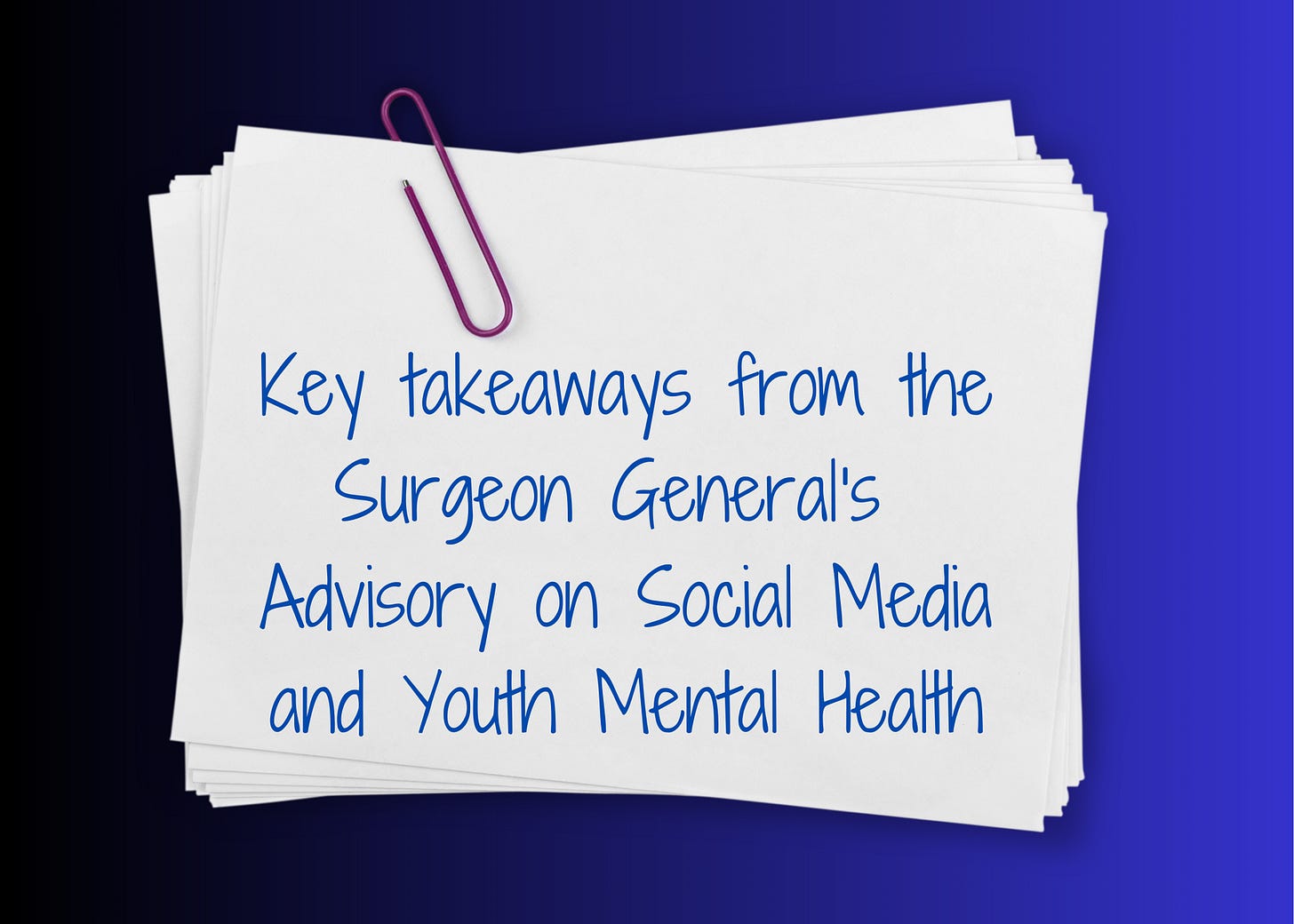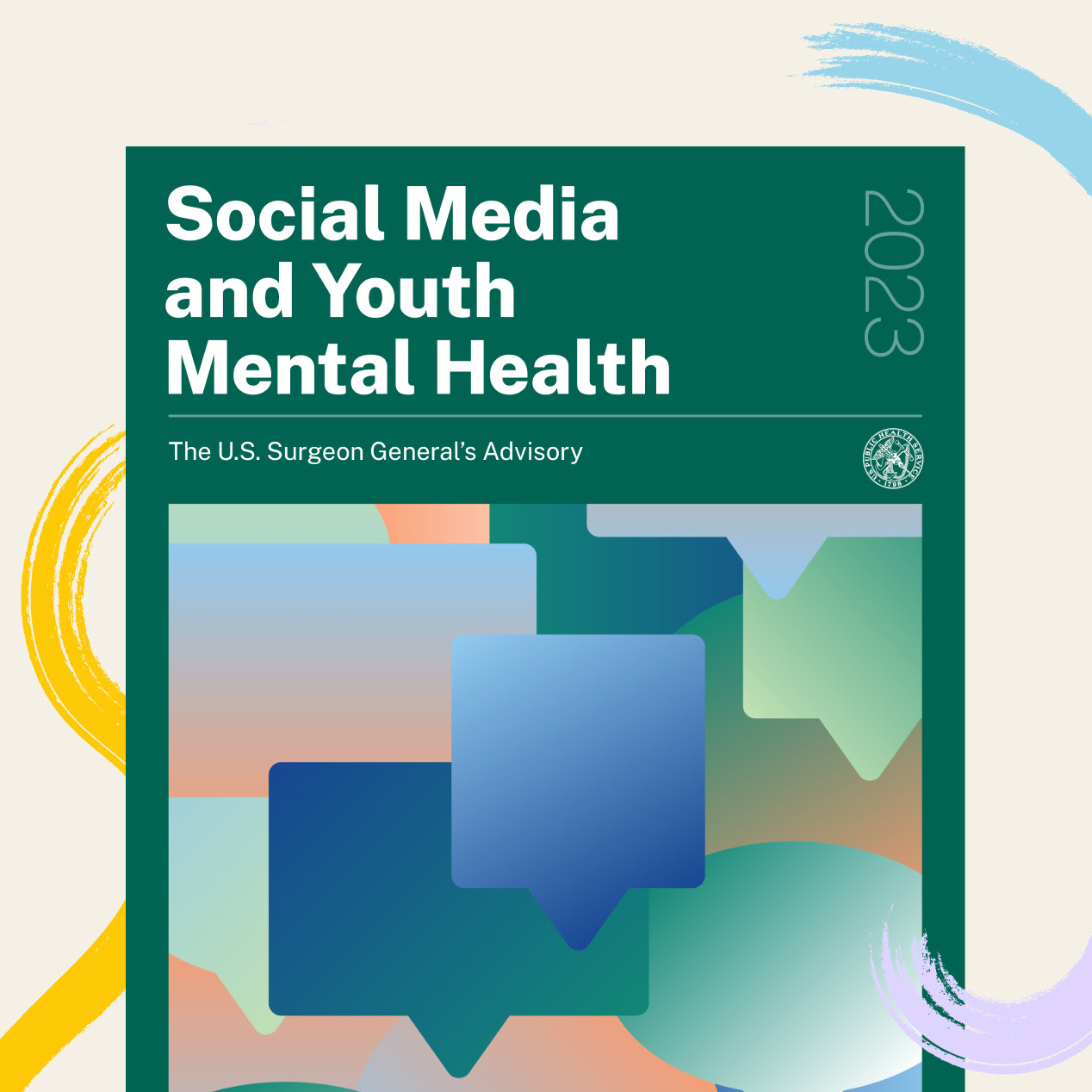Three Things Thursday highlights three things I am paying attention to as an epidemiologist each week.
This week I am paying attention to the Surgeon General’s Advisory on Social Media & Youth Mental Health. Released on Tuesday, this report is a public statement (from the Surgeon General1) that brings attention to an urgent public health issue.
Hoping this post helps to educate and empower you
to be healthy and create healthy communities
According to the Advisory, up to 95% of youth ages 13-17 report using social media. More than one-third of those report that they use social media “almost constantly.” These statistics combined with the fact that adolescents are an important period for brain development are the root of the report.
The Advisory noted that there are benefits to social media use. Youth have found positive communities and connections via social media platforms. And social media has promoted health-seeking behaviors among youth struggling with mental health issues.
HOWEVER —
Research shows that 8th and 10th graders spend (on average) 3.5 hours per day on social media.
Social media is associated with an increased risk of depression and anxiety among adolescents. Specifically, the risk of cyberbullying-related depression has increased as a result of social media use.
Social media platforms are also sites for predatory behaviors and interactions with adults who target kids and adolescents.
We have A LOT left to learn —
There are so many unanswered questions about the relationship between social media and mental health. There is a HUGE need for independent researchers and technology compies/social media platforms to work together to rapidly increase our understanding of the social medial impacts on the mental health of youth and adolescents.
BUT we cannot wait until we have all the answers. We MUST act now —
The youth mental health crisis is occurring now. We must act NOW.
We need age-appropriate health and safety standards.
We need social media literacy curriculum in schools.
Families need to create a social media plan that includes boundaries and rules.
Screen time limits are needed.
Families should also encourage in-person friendships.
As parents, we need to set a good example for our children. And we need to work with other parents to establish shared boundaries and norms for our teenage children.
Additionally, we need to define and prohibit online bullying. And we MUST make sure that our kids do NOT keep online harassment or abuse a secret.
Open, in-person communications are needed.
As the parent of a teenager and tween, this report.
These findings.
The mental health crisis.
Are of GREAT concern to me.
I know we (as a family) could be doing better, but we have put boundaries in place and we do talk about what is appropriate and inappropriate to do online.
We have a no phones at the table rule at our house. We eat dinner together each night. No phones at the table. And we do not eat and scroll social media while we are eating other meals even if no one else is around.
We also have rules about open communication in our home. I have made it a habit to ask my kids to share what is happening (especially those things occurring online) without judgment. I also preface our conversations by asking if my kids want me to just listen or if they want me to help them solve a problem/intervene. Most of the time, they are willing to talk if they know I am not going to provide advice, lecture, or judge them after they have shared with me.
I’m willing to just listen to what is going on.
Being a good listener builds trust.
And it models how to have positive in-person relationships.
Listening puts me in a position to know what is going on. If/when there is a problem, we have a foundation of trust such that I hope/believe my kids will share with me.
And we encourage our kids to get involved in activities that do not include screens — soccer, ballet, reading books, art club, D&D club, summer camps, travel, bike rides, and walks/hikes. We encourage trips to the local coffee shop and fro-yo shop.
And we have weekly dinners (no screens) with our podfamily.
We play games and watch movies together.
It is a lot of work on our part as parents, but we end up having fun together!
And — our tween does NOT have a phone. He can use our family iPad if he needs to get online.
Questions about the Surgeon General’s Advisory? Or ideas/questions about what we can do to get our kids offline? And reducing the amount of time they spend on social media?
And please share this post with your friends and family. We all need to be aware of the Surgeon General’s Advisory on Social Media & Youth Mental Health. And we need to act now. The youth mental health crisis is just that — a CRISIS.
Action is needed now.






